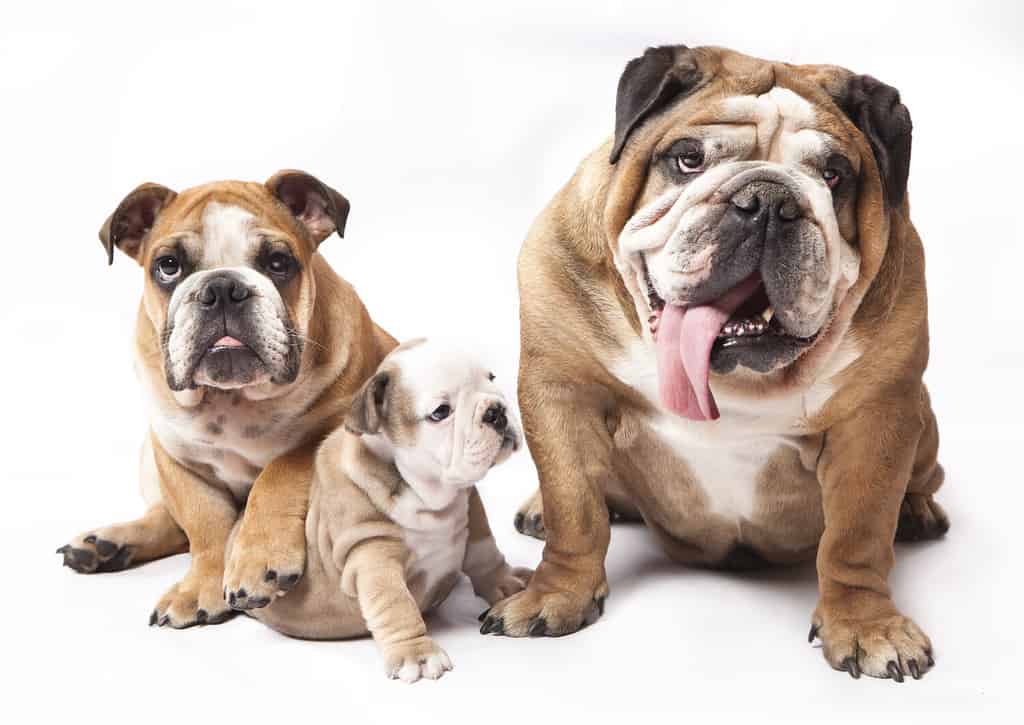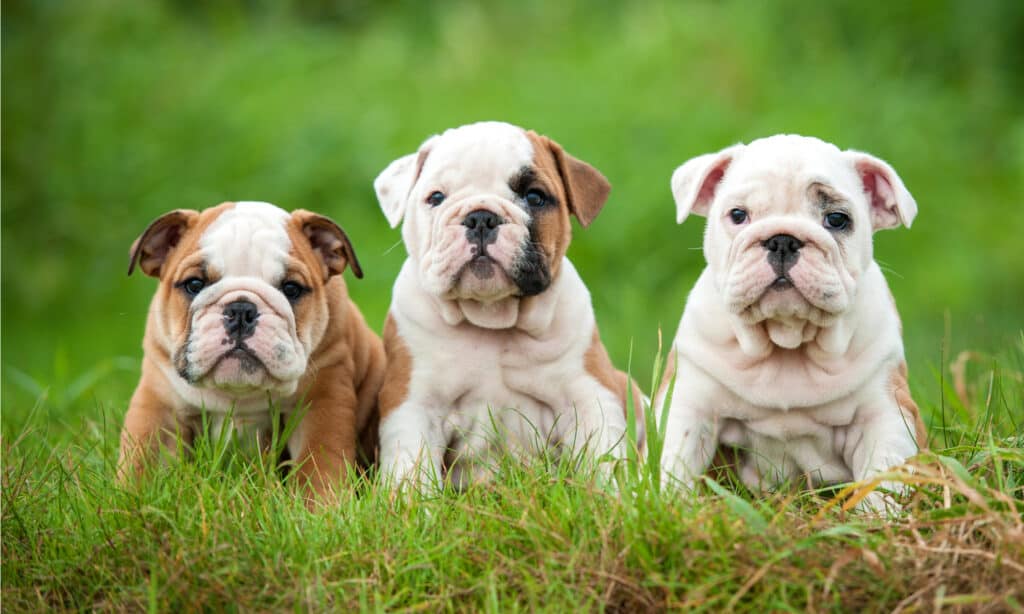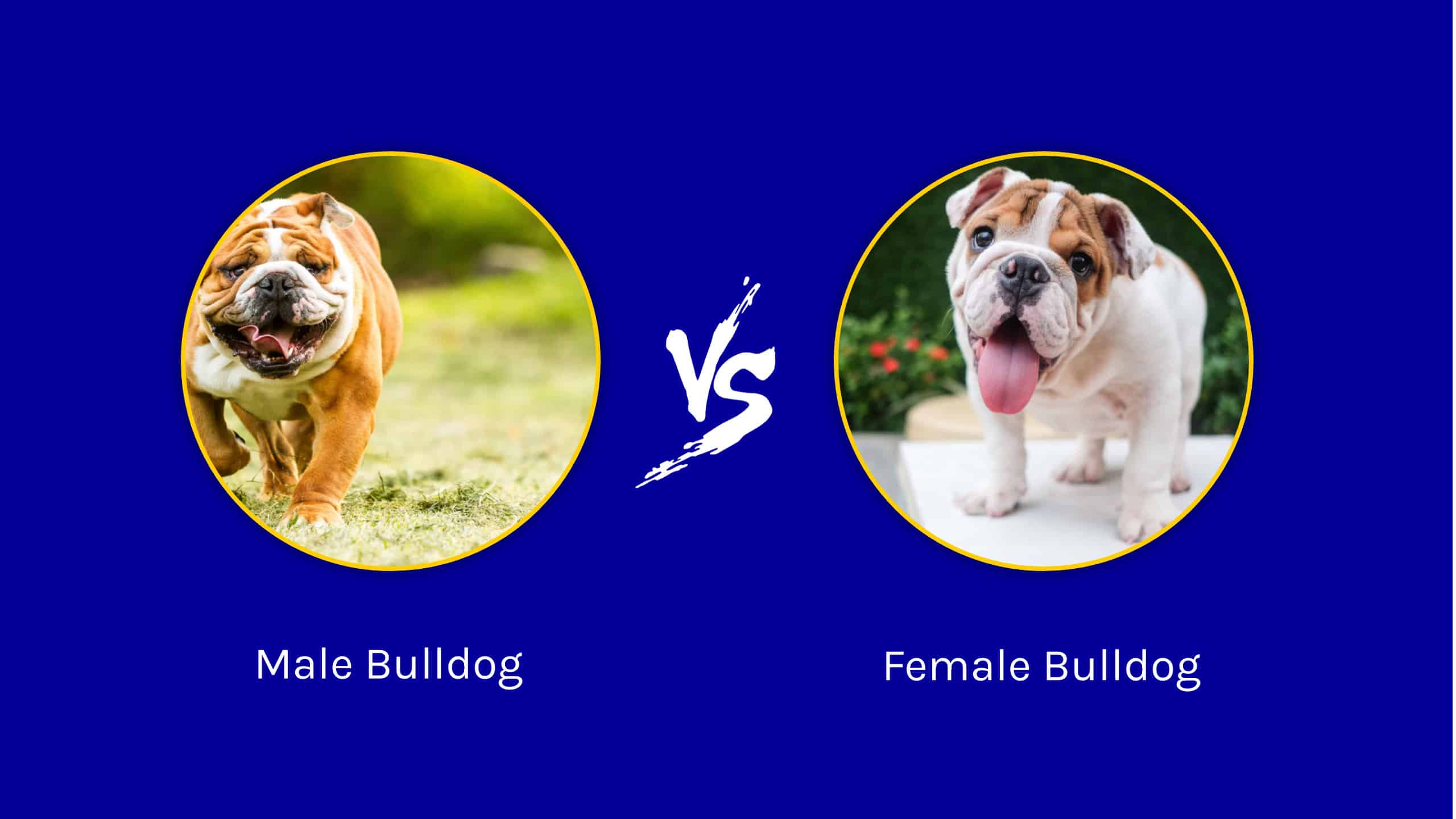Male and female Bulldogs aren’t very different from one another. Key differences include size, lifespan, tendency toward aggression, and the cost to spay or neuter your dog.
Males tend to be larger and may live slightly shorter lifespans. When unneutered, they may also be more prone to aggression, as is the case for all dog breeds. The cost to spay a female Bulldog is higher than the cost to neuter a male.
In this article, we’ll discuss these four key differences between male and female Bulldogs, and also some similarities within the breed.
4 Key Differences Between Male and Female Bulldogs

There are very few real differences between male and female Bulldogs.
©Liliya Kulianionak/Shutterstock.com
| Characteristic | Males | Females |
| Size | 50 pounds | 40 pounds |
| Spay and neuter cost | Lower than spaying females | Higher than neutering males |
| Aggression | More prone to aggression when unneutered | Not as prone to aggression as unneutered males |
| Lifespan | May be slightly lower than females | May be slightly higher than males |
#1: Size
The first difference between male and female Bulldogs is their size. According to the American Kennel Club, male Bulldogs should weigh around 50 pounds while females weigh just 40 pounds.
While this isn’t a huge difference, the size of your dog can change what you pay for food and veterinary costs. Larger pups can also be more difficult to lift if needed or to handle when pulling on a leash.
#2: Spay and Neuter Costs
Spays for female dogs tend to cost more than neuters for male dogs. This is because a spay is a more invasive and complex surgery.
However, you can often find low-cost spay and neuter clinics in your area that charge less for the procedure. In addition, many rescue Bulldogs are already spayed or neutered upon adoption, which can save you the cost altogether.
#3: Are Male Bulldogs More Aggressive?

Unneutered male Bulldogs are more prone to aggression due to hormones, but this is true for all dog breeds and many other species!
©iStock.com/WilleeCole
Unneutered male dogs of any breed are more likely to be aggressive. However, this doesn’t apply to neutered males.
It also doesn’t mean that an intact male Bulldog is bound to be aggressive, or that you won’t ever see aggression in females. It depends on their genetics and upbringing.
A great way to avoid aggression in your Bulldog of either gender is to ensure you’re using science-based and up-to-date training methods. Many outdated training methods, such as dominance theory, promote fear and aggression in dogs.
#4: Are Male or Female Bulldogs Healthier?
Male Bulldogs may have slightly shorter lifespans than females. However, there is only one small study that points to this. Overall, there don’t seem to be significant differences in their health.
Bulldogs in general do tend to be unhealthy due to poor breeding. They can suffer from difficulties breathing and regulating temperature, brachycephalic airway syndrome, eye conditions, skin conditions, joint problems, and more.
Are Male or Female Bulldogs Easier to Train?

Neither male nor female Bulldogs are difficult to train.
©Rita_Kochmarjova/Shutterstock.com
Both male and female Bulldogs tend to be eager to please, which makes training easy. They may not pick up on cues immediately, but instead sometimes need time and repetition in order to understand something new.
Please remember to always use force-free training methods, never punishments or aversives. Keep training sessions short and end on a high note whenever possible to keep your pup coming back for more. End training if you or your dog becomes bored or frustrated.
When done right, training can be a fun, bonding experience for you and your Bulldog.
Grooming a Bulldog
Male and female Bulldogs shed moderately and will shed more during shedding season. They should be brushed two to three times weekly to promote good coat health and remove dead fur.
Keep their wrinkles clean and dry to prevent skin infections. Your Bulldog will also need their ears cleaned, nails trimmed, and teeth brushed regularly.
Are Male or Female Bulldogs Better Pets?
There are many myths when it comes to personality differences between male and female Bulldogs, but most of these are inaccurate. Breed, genetics, and upbringing will all play a larger role in personality traits than the sex of your dog.
Bulldogs are sweet, affectionate dogs who love their human families. They don’t tend to do well when left alone for long periods and are prone to separation anxiety. They’re playful, friendly, and eager to please.
It’s also important to remember that each Bulldog is a unique individual, so no two will act exactly alike. You may find that your Bulldog acts differently from others of their breed, and that’s okay!
Thank you for reading! If you have feedback on this post, please contact the AZ Animals editorial team.
Ready to discover the top 10 cutest dog breeds in the entire world?
How about the fastest dogs, the largest dogs and those that are -- quite frankly -- just the kindest dogs on the planet? Each day, AZ Animals sends out lists just like this to our thousands of email subscribers. And the best part? It's FREE. Join today by entering your email below.
Thank you for reading! Have some feedback for us? Contact the AZ Animals editorial team.








